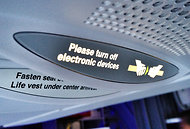 Nick Bilton/The New York TimesA sign on a Virgin America flight tells passengers to turn off electronic devices.
Nick Bilton/The New York TimesA sign on a Virgin America flight tells passengers to turn off electronic devices.
If you’ve ever flown Virgin America, you will have seen the cartoonlike safety video that plays before the flight takes off.
In one scene, about a minute into the video, a man is shown sitting next to a large bull as he fumbles with his seat belt. A voice-over says, “For the 0.0001 percent of you who have never operated a seat belt before, it works like this.”
Few people know that the bull was originally a dog. But when the Federal Aviation Administration reviewed the video, one of the many concerns it had was that passengers would think dogs, which are sometimes on flights, had to wear seat belts — I’m not kidding here — so it made Virgin America change the dog to a bull, as bulls are, thankfully, not allowed on planes.
According to people who were involved in the making of the video, there were six months of meetings with the F.A.A. and changes to the video before it was finally approved.
This was government bureaucracy at its finest, and we may be in for another round of it.
Late last month, the F.A.A. announced that it was putting together an industry working group to study portable electronics usage on planes during takeoff and landing. (Don’t worry about chattering passengers: this is for e-readers and tablets, not for cellphones.)
But how long can these tests take? Given the six-month back-and-forth over a dog wearing a seat belt in a safety video, they might not be finished until the next millennium.
The F.A.A. has indicated the process will take at least a year. “The government-industry group, established through an aviation rulemaking committee, will be formally established this fall and will meet for six months,” it said in a statement.
But the airlines and electronics makers I have spoken with are willing to do whatever it takes to help the F.A.A. approve these changes in a timely manner.
Jeff Bezos, chief executive of Amazon, told me the company had done its own tests on its Kindle e-readers and Fire tablets to help hasten the changes. “We’ve done experiments,” he said. “We loaded a plane with Kindles.”
I asked what happened in the experiments. He looked at me as if I were asking the dumbest question he had ever heard. “Everybody landed,” he said. “It wasn’t a problem.”
Mr. Bezos said Amazon had submitted the results and was waiting to hear back from the F.A.A. But, he said, “They’ve got a process.”
Some airlines, including JetBlue and Virgin America, have notified the F.A.A. of their willingness to help, too.
But the current system of testing electronics devices will most likely have to change before gadgets can be used during takeoff and landing. The agency’s rules state that an airline must test each iteration of a device on each type of plane, without passengers, before it can be approved.
“With individual testing needed for every version of every electronic device out there, it’s practically impossible for an airline to take on the testing independently, so we’re pleased the F.A.A. is evaluating it and taking steps in that direction,” said Abby Lunardini, vice president of corporate communications at Virgin America. She said changing the rules would make flying more enjoyable for Virgin America passengers.
“We are keen to help in any way we can,” said Jamie Perry, director of product development at JetBlue. “The current situation is not working for customers, for airlines or for the F.A.A.”
As new e-readers and tablets are announced on an almost weekly basis, it seems the F.A.A. might have to accept truths like these: People are smart enough to know that dogs don’t wear seat belts, and reading devices like Kindles and iPads don’t affect an airplane’s avionics.
“This is a change that needs to happen,” Mr. Bezos said. “It’s time.”
Article source: http://bits.blogs.nytimes.com/2012/09/09/teaching-the-f-a-a-that-dogs-dont-buckle-up/?partner=rss&emc=rss